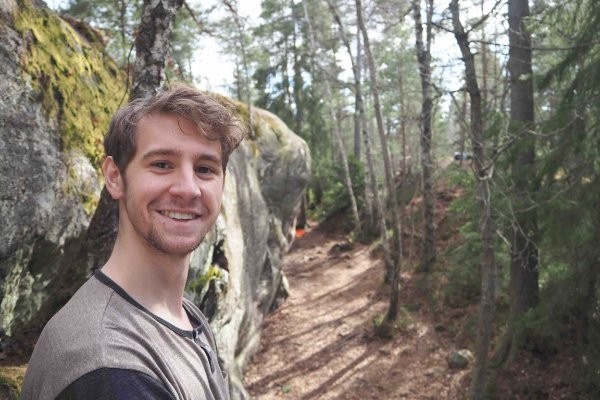Oliver works with improving the diagnosis and treatment of cancer as a PhD student in Canada
Oliver Snow from Canada graduated from the joint master’s programme in Molecular Techniques in Life Science in 2017. He is now doing his second year of doctoral studies at Simon Fraser University in Vancouver, Canada.

Hi Oliver, what have you been up to since leaving KTH?
I am currently in my second year of a PhD programme in Computer Science at Simon Fraser University back home in Vancouver, Canada. My research uses methods in machine learning to analyse large genomic datasets in order to improve the diagnosis and treatment of cancer. Currently I have a collaborative project with the Vancouver Prostate Centre where I am trying to predict mutations in the androgen receptor that lead to resistance in prostate cancer patients.
My typical day is spent in the lab along with other graduate students, on my computer and in meetings with colleagues. I spend a lot of my time reading papers relevant to my work, testing new approaches to my own problem, and evaluating the models that I make. Depending on the stage of the work, I also spend time writing papers or preparing presentations to give to my group or to the larger research community. I try to attend seminars and other events in the department as I love learning about what other people are working with and, sometimes, this can inspire new ideas in my own research or be the start of a collaboration.
Why did you choose this programme?
I chose the programme because it was interdisciplinary, covering topics in translational medicine, high-throughput biology, and bioinformatics all at the same time. I was also attracted by the opportunity to study at three universities (KTH, SU, and KI) and get to access the expertise they each held in these areas. This is in addition to simply wanting to study abroad, experience life in Sweden, and make new international friends and connections.

Are there any insights from your studies that have been particularly useful in your career?
Most important was the computational skillset that I developed while in my programme which gave me the fundamental knowledge that I have now built on in my PhD, but this experience also confirmed for me that I wanted to continue with computer science. I also think the international experience has been really important for me as I got to meet people from many different countries and learned about their perspectives and interests. This has broadened the way that I think and allowed me to better connect with a variety of people.
What were the best aspects of your studies at KTH?
While I think the programme was engaging and interesting with great professors and courses, I think the people in my cohort really made the experience what it was. Given that we were the first year of a somewhat experimental programme, we were only six students and we became really close through the two years of the programme, hanging out lots outside of class and enjoying Stockholm together.
What is your best memory from your time at the universities?
Perhaps this is just my most recent memory but watching everyone’s thesis presentations at the end of the programme was really fun. It was exciting to see what everyone had worked really hard on during the previous years, and to see the variety of topics we ended up covering. It was also interesting to think back to the day that we all first met and to see how much everyone had changed, both in our interests and the new skillsets we had developed.
What are your plans for the future?
My near future plans are to focus on my PhD where I’m learning to be a computer scientist and hopefully publish some good research in my field. Longer term, I see myself still working in research and doing computational work but whether that be in academia, industry or in the public service/government remains to be seen. I’ll be happy as long as I get to solve interesting challenging problems and work with other curious and talented people.
What would you to say to a student thinking of applying for this programme?
I would definitely recommend it if they are looking for a unique programme where you can attend and make connections at three universities as well as get a broad education on the variety of topics surrounding modern biomedical research. And, of course, Stockholm and Sweden in general is a fun and comfortable place to study.

